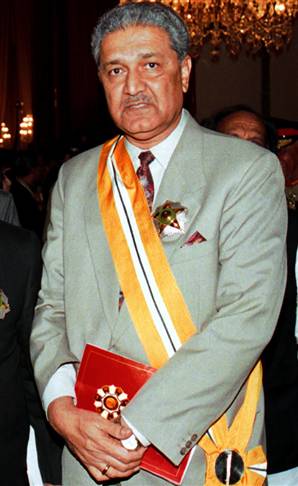 Pakistan Nuclear Terrorist :Abdul Qadeer Khan
Pakistan Nuclear Terrorist :Abdul Qadeer Khan
In a development which is sure to raise international concern over the loose nukes in Pakistan, the architect of Pakistan's nuclear bomb and the man responsible for leaking nuclear know-how to countries like North Korea and Iran, A Q Khan, was declared a "free man" by the Islamabad high court on Friday. India reacted swiftly by describing his release as detrimental to global peace.
Khan, a poster boy for many jihadi groups, had virtually been under house arrest for several years and this development, according to some media reports in Pakistan, is a result of the nuclear scientist negotiating a clandestine settlement with the civilian government. Khan had been desperately seeking withdrawal of the restrictions placed on him by Pervez Musharraf since the former president and army chief relinquished power.
Khan, as he told reporters after his release, can now not just move around freely in the country but also carry out research activities. Khan is extremely popular with Islamic extremists, including Al Qaida, all over the world and has been hailed for the creation of the first Muslim nuclear weapon state in the form of Pakistan.
In fact, more than 100 jihadi groups who had assembled in Muzaffarabad three days ago for a meeting had demanded Khan's release. Khan's associate and Pakistani scientist Bashiruddin Mehmood has admitted that he had met both Osama bin Laden and his No.2 Ayman Al Zawahiri. Osama is said to have acquired fissile material through these scientists.
India's minister of state for foreign affairs Anand Sharma described the development as a hindrance for global peace and security. Sharma insisted that this was another example of Pakistani deception. "Pakistan has deceived India again by setting Khan free," he added.
Khan had taken responsibility for leakage of nuclear secrets in 2004 after which Musharraf placed him under house arrest even as he said that he had pardoned the scientist.
The US last month had slapped sanctions on 13 individuals and three private companies for their involvement in the clandestine nuclear proliferation network run by Khan. "Khan, who is currently under house arrest, led an extensive international network for the proliferation of nuclear equipment and know-how that provided one stop shopping for countries seeking to develop nuclear weapons," the state department had said on January 13.
After his release, Khan said he was not bothered about what the US, India or Pakistan thought about him. On being asked about the threat from India, Khan said Pakistan's armed forces were capable enough to deal with any threat.
Khan, a poster boy for many jihadi groups, had virtually been under house arrest for several years and this development, according to some media reports in Pakistan, is a result of the nuclear scientist negotiating a clandestine settlement with the civilian government. Khan had been desperately seeking withdrawal of the restrictions placed on him by Pervez Musharraf since the former president and army chief relinquished power.
Khan, as he told reporters after his release, can now not just move around freely in the country but also carry out research activities. Khan is extremely popular with Islamic extremists, including Al Qaida, all over the world and has been hailed for the creation of the first Muslim nuclear weapon state in the form of Pakistan.
In fact, more than 100 jihadi groups who had assembled in Muzaffarabad three days ago for a meeting had demanded Khan's release. Khan's associate and Pakistani scientist Bashiruddin Mehmood has admitted that he had met both Osama bin Laden and his No.2 Ayman Al Zawahiri. Osama is said to have acquired fissile material through these scientists.
India's minister of state for foreign affairs Anand Sharma described the development as a hindrance for global peace and security. Sharma insisted that this was another example of Pakistani deception. "Pakistan has deceived India again by setting Khan free," he added.
Khan had taken responsibility for leakage of nuclear secrets in 2004 after which Musharraf placed him under house arrest even as he said that he had pardoned the scientist.
The US last month had slapped sanctions on 13 individuals and three private companies for their involvement in the clandestine nuclear proliferation network run by Khan. "Khan, who is currently under house arrest, led an extensive international network for the proliferation of nuclear equipment and know-how that provided one stop shopping for countries seeking to develop nuclear weapons," the state department had said on January 13.
After his release, Khan said he was not bothered about what the US, India or Pakistan thought about him. On being asked about the threat from India, Khan said Pakistan's armed forces were capable enough to deal with any threat.



0 comments:
Post a Comment